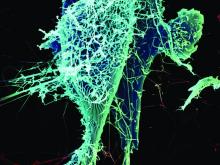In response to the Ebola outbreak in the Democratic Republic of Congo (DRC), the Food and Drug Administration has announced steps the agency is taking to make diagnostic and medical products available as part of critical response efforts.
In addition to providing scientific and regulatory advice to medical product developers, the FDA is using its authorities to ensure Merck’s investigational Ebola Zaire vaccine is made available appropriately to vaccinate high-risk populations in the DRC. Additionally, the FDA also is committed to facilitating the development of investigational drugs for the treatment of Ebola virus and supporting access to these products under appropriate regulatory pathways, FDA Commissioner Scott Gottlieb, MD, said in a statement.
“Specifically, the FDA’s experts are supporting the WHO’s [World Heath Organization’s] efforts to assess currently available data on investigational drugs for Ebola as well as possible mechanisms to enable appropriate access outside of a clinical trial setting until scientifically sound clinical trials can be established. We’re also helping assist sponsors to make sure an adequate supply of these treatments is available. In addition, we’re continuing to work closely with diagnostic developers and researchers to support Ebola test development and availability. There are 10 Ebola diagnostic tests available for emergency use under the FDA’s Emergency Use Authorization authority. The FDA also has cleared one test for the detection of Ebola that can be used in designated laboratories. The FDA remains closely engaged with diagnostic manufacturers to assess current inventories of these tests as well as manufacturing capacity in support of response efforts,” Dr. Gottlieb said in the statement.Clinical trials that are adaptive to the circumstances of an outbreak are essential, he added. “During the 2014-2015 Ebola outbreak, the FDA recognized that some of the medical products that initially appeared to show great promise sometimes, when subjected to objective testing, were not effective or may have done more harm than good.”
Further, as there are no approved treatments or vaccines for Ebola, the agency will be monitoring for false product claims to protect consumers from fraudulent products claiming to prevent, treat, or cure the disease.
“The FDA knows that it takes a sustained, robust, and globally coordinated effort to best protect our nation from various infectious disease threats,” Dr. Gottlieb wrote. “We’re committed to supporting the people of the DRC and preventing a worsening circumstance during the current outbreak. And we remain highly engaged in the international response efforts.”


